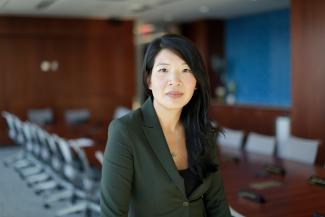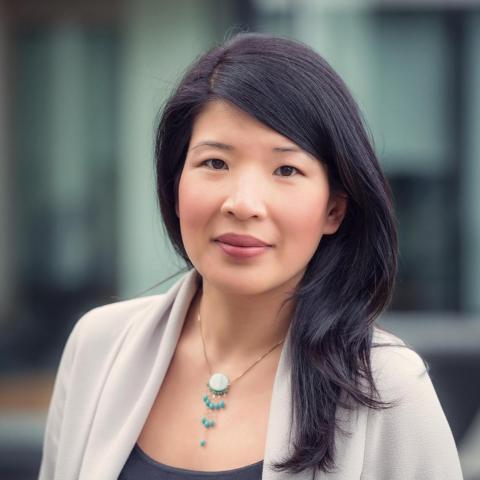Power, Gender, and Race in the Legal Profession

CBL Assistant
Jun 19, 2020
On March 5, 2020, Dr. Carol Liao delivered the final keynote speech at the 43rdAnnual Women in Law Dinner at the Fairmont Hotel in Vancouver, one week before the city went into COVID-19 lockdown. She spoke on power, gender, and race in the legal profession, and received a standing ovation following her speech. The event was organized by the Allard Law Women’s Caucus and attended by 300+ women lawyers and their supporters. Here is the transcript from her speech.

Thank you so much for having me here. It is an honour to be here. When I first received this invitation to speak, it made me think about when I started law school 20 years ago, and how I was so full of hopes and dreams. But the path from then until now has been so windy and uncertain. Sometimes I feel like I’ve been a surfer and the legal profession is an ocean that has tried to spit me out more times than I can count. The precarity with which I have arrived at this point transitioning from practice to academia…it makes me feel truly grateful for the privileged position that I am in now, but I have to admit, it is not necessarily a path I would recommend to people. So I was surprised when I was told that students of mine were inspired by some of the stories I shared in class and wanted me to speak here.
But you know, I do have a lot to say. Every woman has a different story, with different variables and different challenges. Mine is not a unique experience. I have in many ways lived a very lucky life to be standing where I am now. But that is the point, as someone who is now not so vulnerable, how grateful I am to be able to give some voice to those experiences and discuss the structural changes that need to happen to protect women and other marginalized groups as they try to rise up and contribute to the betterment of this profession.
So I want to thank the Allard Law Women’s Caucus for inviting me here, and giving me this moment in time to share with you all – my fellow women lawyers and allies – some thoughts that I have as a researcher, and as a woman in law. And those thoughts are incomplete without also telling my story as a racialized woman in law.

First, I want to talk about one of my research passions in my field of corporate law, which is about understanding power.
I’m a corporate governance geek. I think a lot about what makes corporations tick, how they are run, the laws and regulations surrounding them, the very uncomfortable levels of power they wield in society, and the impact they are having on climate change as we live under this climate emergency. Now, many legal concepts address different power dynamics in corporate governance. A lot of my students are here – we know directors, officers, and shareholders all hold certain powers. Many stakeholders also hold powerful influences. But other notions of power have a pervasive impact on human ordering.
We do not live on our own self-determined island. We live in a world with a gendered and colonial history, a history that is passed down in concept form from generation to generation. This history reverberates in the principles that guide regulatory development, and affects the decisions that corporations make every day – directly and indirectly influencing the ways in which issues are identified as problems, how these problems are solved, and whose interests are deemed worthy of protection.
Feminism is diverse, but some common traits of feminist theory draw upon notions of equality and ethics of care. In the context of corporate law, these include challenges to the myopic focus on short-term profit to the detriment of long-term economic, social, and environmental sustainability. Awareness of power imbalances in the boardroom, and in the day-to-day functioning of corporate activities, are critical in reform efforts.
And the biggest error I think people make is assuming that things are going to be solved through time. Many people hear the stats on board diversity, for example, and think, “bah, it’s only a matter of time.” But let’s be clear. If boardrooms and the C-suite are the centres of corporate decision-making and power, then please understand the numbers are absolutely abysmal.
You heard the numbers from Rebecca Morse on women in the legal profession. In corporate boardrooms, women only make up 16 percent of board seats. The hilarious part is that we’ve had a “comply or explain” regime for gender diversity in Ontario since 2015. Even when countless studies show having more women on boards “fuels groundbreaking innovation, improves efficiency, increases sustainability, spurs growth, reduces risks” – so playing by the business case rules – those numbers still remain low, in the teens. We would rather “explain and explain” than comply.
Now let me add some more numbers. Racialized people only make up four percent of board seats, and Indigenous peoples make up less than one percent.
These incremental gains that have been made in gender diversity, as small as they are, have been the result of concerted, persistent, and ongoing individual efforts that in fits and spurts have collectively moved us towards change. At these rates, gender parity is not going to happen in my children’s lifetime.
As for visible minorities in the boardroom – you should know that it took five years to move up half a percent. As Dr. Malinda Smith points out, “When we say the women are improving, what we’re not saying is that is not true for racialized minority women, not true for Indigenous women.”

The Geena Davis Institute on Gender in Media has a motto: “If she can see it, she can be it.”
The first time I saw an Asian woman on TV, it was Lucy Liu in the legal drama Ally McBeal. I wish I had a cooler and less mainstream example of a very transformative moment for me. But it was 1998 and I was 20. That was the first time, and it actually made me pause. Until that moment, I didn’t realize how much it mattered to see someone of the same race and gender as me on TV. And she was smart. And a lawyer. Yes she was also typecast as a bit of a dragon lady, but back then it didn’t even occur to me to be bothered. I waited every week for that show to be on – remember those days, when you had to wait and couldn’t just binge all night?
As a child of Taiwanese immigrants, growing up in Chilliwack in the 80s, I had ample opportunities to understand the importance of different perspectives. The racism some of us have to endure as children – it does something to you. Feminism easily folded into these untitled notions that had already been floating around in my head.
Accepting feminism when you are young is one thing, but living as a feminist in the business world and into motherhood is another. When I was recruited by a large New York City law firm, I asked to join their Mergers & Acquisitions Group because it was one of the best in the world, but I cannot deny that it was also satisfying to know it was a male-dominated practice. I wanted to be there in the financial epicentre, and know I could hold my own with the big boys. And you know what? I could, and I was good at it.
It wasn’t until my husband and I began to think about starting a family that my gender in the workplace became uncomfortably relevant to me. I remember spending hours contemplating my career options and the pitiful maternity leave policies in the US. Even being pregnant at the firm seemed unpleasant. I remember being in the office late every night for weeks on end and seeing my heavily pregnant colleague working the same hours. I distinctly recall watching her tiredly limp past my office on an umpteenth 4am work night. At that moment I told myself that that would never be me.
I quit when I was three months pregnant. My husband and I moved back to Vancouver to be near our families. He returned to his former job at his law firm. I, on the other hand, was pregnant and unemployed.
It is so funny how realities in life can strip you of ideals that you held so close in your youth. This determination I had to break down gender stereotypes – in the name of feminism! – came to a screeching halt at just the idea of having children of my own.
I decided to apply to graduate school when my daughter turned one. I remember when I applied and told my story to one of the university’s advisors, she asked me, “But if you do your LLM, who’s going to take care of your kid?” In a very judgmental tone, may I add. I had just quit my job and taken a 99% pay cut to be with my kid, while doing graduate school on the side while she napped, and I was still supposed to feel guilty as a mother? I almost had to laugh.
I’m going to stop here to say the amount of guilt heaped upon women is so disappointing to me, in all honesty. I have always wrestled with what has been expected of me as a woman versus what I expect of myself. Women are made to feel guilty about everything. Wanting children, not wanting children, having just one kid, having too many. Raising them one way or another. Being second guessed on our life choices every step of the way. I almost didn’t want to talk about raising children tonight because I don’t want to imply anything on women and their life choices. This daily tightrope that we have to walk every day, the conflicting messages we get. It’s exhausting.

The next few years were an immense blur of diapers, graduate school, and very late nights for me trying to establish myself as a scholar. My New York experience served me well in that sense. Rather than staying up until 4am, I was just woken up every four hours, which seemed to be an improvement. But in those years between babies and school, I knew the odds were almost impossible for me to land an academic job. Twenty percent of PhDs get academic jobs, and that’s with the ability to travel anywhere and apply to more places than the one in your hometown where you got most of your degrees from, which is a huge no-no in academia, by the way. Going back into practice also seemed impossible – leaving practice is like a ball rolling down a hill and starting all over again after all those years away seemed so daunting. My economic cost-benefit analysis brain just couldn’t cost it out. I felt lost. I want to say – I loved being a stay-at-home mom and all the joys that come with it. But I refuse to forget how demoralizing a time that was for me career-wise, thinking about how hard I had worked and wondering if I was done.
Studies have shown how women often plan on returning to the workforce after leaving for a short while to attend to familial needs, but then become stuck. The financial penalties for taking a time out are extraordinarily punishing and many women are lost upon re-entry. If this were a movie that could show the 100 different ways this could have turned out for me, 99 of them would have been me, no longer in the legal profession. And I don’t say that with any sense of pride whatsoever that I ended up staying. The choices women must make to stay in law should not be so hard. We should not have to be unicorns, superwomen, performing moonshots in order to get jobs that match our skills, and needing to transform ourselves to be valued.
I deliver training sessions on EDI, anti-racism and unconscious bias to boards and executives with my dear friend Shona McGlashan, who is a VP at Vancity. We volunteer to do this on the side of our full time day jobs for these high powered executives because we have those connections now, and we hope that these conversations make a difference. And when I made this point once about how it is often women that are the ones needing to take time out for familial needs, one executive, who genuinely – you know, no judgment – wanted to be helpful, tried to explain that it wasn’t a gendered thing at all, but it was a neutral economic decision that couples make and simply the person who makes less money is going to be the one staying at home. My response then, which I share with you, is that we pay women 80 cents on the dollar. We have historically devalued women’s work in society. Studies have shown that an increased proportion of women in an occupation actually has had a net negative effect on wages. So we need to peel back the onion and recognize these structural issues.
I cannot imagine how it is for women that did not have what I had – financial security, an incredibly supportive partner that is a true co-parent and cleans the house more than me, supportive family and friends. My students tell me all the time about how at these wine and cheeses they get told, directly and indirectly, that they will probably have to choose between whether to have children and be an involved parent or these jobs. That enrages me. I find the law to be such an unforgiving profession for women. Women are judged not only on past and actual pregnancies but perceived future ones as well, meaning even if you don’t want children, the fact that you could one day has been empirically shown to work against you in hiring rounds. While I deeply appreciate the multitude of childcare arrangements available as well as the vastly better parental leave policies here in Canada compared to the US, I feel these choices mask bigger systemic problems. I acknowledge that there are alternative career options for women, but in order to obtain influential positions of political and economic power in this world, a person must travel along a career path that in the past was designed primarily for men with stay-at-home wives. The travellers have changed, and it is time for the model to change as well.
When I left practice over a decade ago, I left with my eyes open, knowing the career risks I was taking with my choices. How easy it is now once you “make it" to have all those decisions seem exactly right. But we cannot blind ourselves to the barriers that are still there for the women that follow us. I remember all those years in limbo when I wished that the ambitious side of me would quiet down and shut up, because the solution then would be so much easier. But that feeling troubles me on a broader scale. Women have an interest in how decisions are made in this world. If we keep relinquishing our ambitions, despite our education and skills, then we will never be the ones making those decisions. That is a structural problem, and a feminist one.
If she can see it, she can be it.
The first time I saw an Asian woman give a speech to a crowd, I was 35. It was Grace Wong Sneddon, and she was the diversity officer when I attended an orientation for new professors at the University of Victoria. And the first time I was in a classroom taught by a racialized female professor, it was 2015, and it was me.
Minelle Mahtani, who has the role as Senior Advisor to the Provost on Racialized Faculty, describes “racialization” as when race and all its accompanying stereotypes is foisted upon you. I think most visible minorities can relate to this at some point in their lives – statements ranging from, “You speak pretty good English,” “No, where are you really from,” all the way to the run-of-the-mill racial slurs, such as when one was shouted at me through my open car window as they drove by, with my three children seated behind me in the back of the van. Of course, pretty much all of us are disgusted by overt acts of racism. We are privileged to live in a country where those moments can almost be compartmentalized and thrown away, along with the garbage. But it is the more subtle and systemic acts of racism that can keep me up at night. Moments occasionally punctuated by very racially tinged live issues in this city.
And I want to be clear. I don’t speak for all the races. And there is not only one Asian culture but dozens, and interminority racism also exists. As Kimberlé Crenshaw points out, an intersectional understanding of lived experiences and social categorizations – including gender, race, sexual orientation, disability, Indigeneity – are highly relevant in the context of power structures and different forms of privilege. My lived experiences are inherently different from those of, say, a Black male’s, a person with disabilities, an Indigenous woman’s, a member of the LGBTQ+ community. Intersectionality is hard work, and it is important work.
But I bring up race for three reasons: first, because of the dumpster fire that is going on in the Law Society of Ontario right now regarding equity issues, which I hope never appears here in BC. Second, because we need to talk about race, even if it makes us uncomfortable. One of my favourite quotes is from Ta-Nehisi Coates, who says, “Race is the child of racism, not the father.” We need to talk about race because racism exists. When you don’t acknowledge context – no race, no gender – then that supposed blank slate will likely be filled by norms of privilege, and you are failing to address the power disparities that flow from structural inequalities.
We need to recognize that we are all situated in these contexts. This notion of situatedness. I credit my dear colleague, Darlene Johnston, for that word, who, as an Indigenous woman in academia, lives with it as a reminder every day. There needs to be an understanding of context, and that everyone is situated. Not just those in the minority. Stereotypes are influencers of believability, legitimacy, and authority.
And the third reason I bring up race is because studies show that it can be emotionally taxing and professionally risky to have to explain race to people – so, I am doing this so I can take some of the burden off those women of colour in the room that are tired. I’m doing this for them.
I know every time I walk into a boardroom, a new classroom, that I have to work harder to legitimize myself. Not because I think people are bad, not in the least. But because I am a researcher and I believe in science, and studies have shown time and again the inherent biases we have. The bamboo ceiling is just as real as the glass one.
In planning for today's event, the organizers invited me to discuss whatever I wanted, with the very light suggestion that I could speak about resilience. Clearly, I’ve talked about whatever I wanted, which are my thoughts on power, gender, and race. But let me talk about resilience in my last minute. I’d like to say that I think women are some of the most resilient people I know. And when I get talked over in meetings, when a male colleague derides me for not reminding him about something he forgot as though I’m his assistant, when yet another person confuses me with some other Asian woman they know, when I have to hear about how difficult it is for white men nowadays and that I’m lucky that I’m a woman and not white, I don’t need to be resilient. What I need is… serenity now.
I hope I am never resilient enough to absorb these things. Allow me not to forget these moments as I get older and know there are those travelling after me… that I remember all of it while I help to clear a path for them, and proudly hold them up when they surpass me.
Whenever Shona and I do our sessions with boards on diversity and inclusion, I have to confess, every time I feel like I am giving up a piece of myself. It is not easy for me to talk about these things. But I do it. Not because I’m resilient. But because of something my colleague Lee Schmidt told me once, after I had exposed myself raw in front of people. She turned to me, whispered and said, “Vulnerability is strength.”
Women get a lot of advice on how to succeed – networks, mentors, etc. – I agree with all of it and I have done all of it. Without those things and the many women and men that supported me professionally, including my Dean who has enabled me to thrive in my job, I would not be here. I acknowledge the privilege I have to be able to struggle with these issues. I think about my three daughters and what kind of example I want to be to them, and I feel I have so much more to do, to give them a better future. After all these years as a researcher, thinking about how we foster change in this world, and how we limit global warming to 1.5 degrees, I know it is impossible without diversity and inclusion in governance, and it is impossible without the continual and persistent individual efforts of many people. So it is time now for that unapologetic call for change. Thank you very much.
This transcript has been subsequently published in the Canadian Journal of Women and the Law.
- Allard School of Law
- Centre for Feminist Legal Studies



